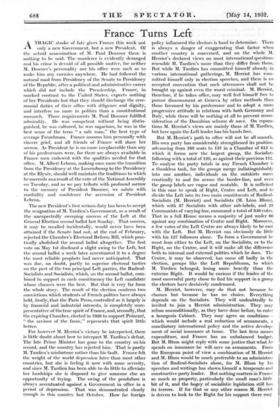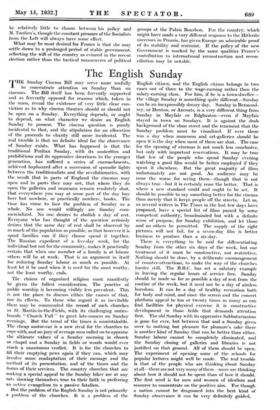France Turns Left
ATRAGIC stroke of fate gives France this week not . only a new Government, but a new President. Of the actual assassination of M. Paul Downer there is nothing to be said. The murderer is evidently deranged and his crime is devoid of all possible motive, for neither M. Doumer's personality nor his office were such as to make him any enemies anywhere. He had followed the natural road from Presidency of the Senate to Presidency of the Republic, after a political and administrative career which did not include the Premiership. France, in marked contrast to the prated States, expects nothing of her Presidents but that they should discharge the cere- monial duties of their office with diligence and dignity, and interfere no More in politics than a constitutional Monarch. Those requirements M. Paul Downer fulfilled admirably. He was competent without being distin- guished, he was cultured, he was sagacious, he was in the best sense of the term " a safe man," the best type of average Frenchman. France mourns him personally with sincere grief, and all friends of Fiance will share her sorrow. As President he is no more irreplaceable than any of his predecessors were, for there arc always available in France men endowed with the qualities needed for that office. M. Albert Lebrun, making once more the transition from the Presidency at the Luxembourg to the Presidency at the Elysee, should well maintain the traditions to which be succeeds as a result of the vote of the National Assembly on Tuesday, and as we pay tribute with profound sorrow to the memory of President Doumer, we salute with cordiality and confidence the accession of President Lebrun.
The new President's first serious duty has been to accept the resignation of M. Tardicu's Government, as a result Of the unexpectedly sweeping success of the Left at the General Election second ballot last Sunday. That success, it may be recalled incidentally, would never have been attained if the Senate had not, at the end of February, rejected the Chamber's Electoral Reform Bill, which prac- tically abolished the second ballot altogether. The first vote on May 1st disclosed a slight swing to the Left, but the second ballot a week later accentuated it to a degree the most reliable prophets had never anticipated. That was due, no doubt, partly to superior electoral tactics on the part of the two principal Left parties; the Radical- Socialists and Socialists, which; on the second ballot, com- bined to support in each constituency the Left candidate whose chances were the best. But that is very far from the whole story. The result of the election confirms two convictions which students of French politics have always held, firstly, that the Paris Press, controlled as it largely is by financial and industrial interests, is completely unre- presentative of the true spirit of France, and, secondly, that the expiring Chamber, elected in 1928 to support Poineare, "the saviour of the franc," represents that spirit little better.
For however M. Herriot's victory be interpreted, there is little doubt about how to interpret M. Tardicu's defeat. The late Prime Minister has gone to the country on his record, and the country has rejected him. That is partly M. Tardieu's misfortune rather than hislault. France felt the weight of the world depression later than most other countries, but she is feeling it now with some severity, and since M. Tardiest has been able to do little to alleviate her hardships she is disposed to give someone else an opportunity of trying. The swing of the pendulum is always accentuated against a Government in office in a period of depression. That was demonstrated clearly enough in this country last October. How far foreign
policy influenced the electors is hard to determine. There is always a danger of exaggerating that factor when another Country is concerned, and on the whole M. Herriot's declared views on most international questions resemble M. Tardieu's more than they differ from them. But while M. Tardieu has committed himself already in various international gatherings, M. Herriot has com- mitted himself only in election speeches, and there is an accepted convention that such utterances shall not be brought up against even the worst criminal. M. Herriot, therefore, if he takes office, may well feel himself free to pursue disarmament at Geneva by other methods than those favoured by his predecessor and to adopt a more progressive attitude in relations with both Germany and Italy, while there will be nothing at all to prevent recon- sideration of the Danubian scheme de NOVO. On repara- tions M. Herriot's views are mainly those of M. Tardieu, but here again the Left leader has his hands free.
But M. Herriot's path to office will not be all smooth. His own party has considerably strengthened its position, advancing from 109 seats to 157 in a Chamber of 615 in which it forms now the largest group, the Socialists following with a total of 129, as against their previous 112. To analyse the party totals in any French Chamber is a thankless task, for the groups merge indistinguishably into one another, individuals on the outskirts move erratically to and fro across the border-line, and even the group labels are vague and mutable. It is sufficient in this case to speak of Right, Centre and Left, and to divide the Left into its two main constituents of Radical- Socialists (M. Herriot) and Socialists (M. Leon Blum), which with 87 Socialists with other sub-labels, and 23 Conummists of varying hue, command a total of 846 votes. That in a full House means a majority of just under 80 against any combination of Centre and Right. Moreover, a few votes of the Left Centre are always likely to be east with the Left. But M. Herriot can obviously do little with his 157 followers alone. To form a Government he must lean either to the Left, on the Socialists, or to the Right, on the Centre, and it will make all the difference both to internal and external politics which he does. The Centre, it may be observed, has come off badly in the election, groups like the Left Republicans, to which M. Tardiest belonged, losing more heavily than the extreme Right. It would be curious if the leader of the most successful party chose to find his support in a group the electors have decisively condemned.
M. Ilerriot, however, may do that not because lie chooses but because he has no choice. Everything depends on the Socialists. They will undoubtedly be invited to join a Herriot administration. They may refuse unconditionally, as they have done before, to enter a bourgeois Cabinet. They may agree on conditions— which would include a real reduction of armaments, a conciliatory international policy and the active develop- ment of social insurance at home. The last item means expenditure, and France has an unbalanced -budget: But M. Blum might reply with some justice that what lie spends on insurance he will save on armaments. From the European point of view a combination of M. Herriot and M. Blum would be much preferable to an administra- tion of Radical-Socialists alone, for M. Blum by his speeches and writings has shown himself a temperate and constructive party leader. But nothing matters in France $o much as property, particularly the small man's little bit of it, and the bogey of socialistic legislation still has. its terrors. If for that or any other reason M. Herriot is driven to look to the Right for his support there may
he relatively little to choose between his policy and M. Tardieu's, though the constant pressure of the Socialists from the Left will always have some effect.
What may be most desired for France is that she may settle down to a prolonged period of stable government, reflecting the -wilt of the country as evinced in the recent election rather than the tactical manoeuvres of political
groups at the Palais Bourbon. For the country, which might have made a very different response to the Hitlerite successes in Prussia, has given Europe an admirable proof of its stability and restraint. If the policy of the new Government is marked by the same qualities France's contribution to international reconstruction and recon- ciliation may be notable.





































 Previous page
Previous page